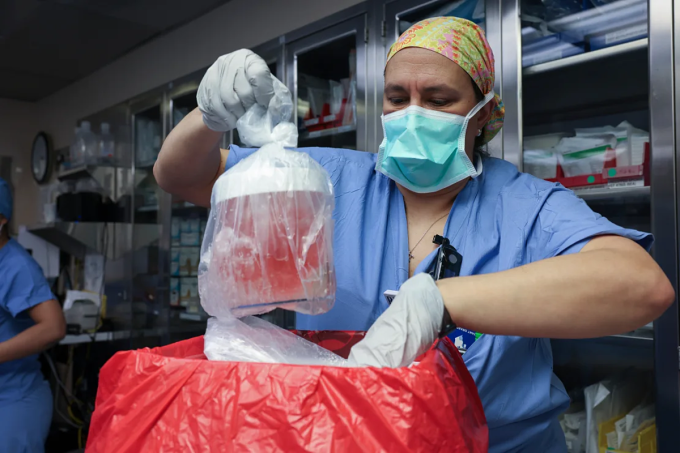Although the first pig kidney transplant recipient has died, scientists continue to test this method to solve organ shortages and save many lives.

Richard Slayman, 62, the world’s first pig kidney transplant patient, has died just two months after the surgery at Massachusetts General Hospital (MGH). Doctors initially thought the new organ would give him two more years of life. Despite the disappointing results, experts say xenotransplants remain an effective solution to the ongoing organ shortage.
Slayman, who has end-stage kidney disease, received the transplant in a four-hour surgery on March 16, according to a representative from Massachusetts General Hospital. Without a transplant, most patients like Slayman require daily dialysis to remove waste that their kidneys can no longer filter. Even with this difficult treatment, the patient's prognosis is only five to 10 years, according to the National Kidney Foundation.
Slayman's health improved immediately after the transplant, the medical team said. The kidney was producing urine - an encouraging sign that the organ was functioning and being accepted by the patient's body. According to Massachusetts General Hospital, there is no indication that Slayman's death was the result of the experimental transplant. The cause of his death is currently unknown.
Dr. Bartley Griffith, a cardiothoracic surgeon and vice president for innovation at the University of Maryland School of Medicine, said the surgery remains a significant, meaningful event for the medical profession. As the man who performed the world’s first genetically modified pig heart transplant, Dr. Griffith stressed that the significance of pig kidney transplants goes far beyond the experimental stage.
According to OrganDonor.gov, more than 100,000 Americans are on the transplant waiting list, and 17 people die waiting each day. Only patients who meet strict requirements are selected for transplants. Organs must also be carefully selected, including size and blood type.
The pig’s internal organs, such as the kidney transplanted on March 16, were taken from cloned animals, Griffith said. He said the animals were carefully raised and humanely euthanized after living comfortable lives.
In the near future, American scientists will continue to test these types of transplants. A second patient who received a genetically modified pig kidney is recovering in the hospital and is being closely monitored.
Animal organ transplantation, also known as xenotransplantation, has a long history, with scientists attempting to do so for nearly two centuries. The first operation was performed in 1838, in which scientists transplanted a pig cornea into a human eye. The operation was unsuccessful and was not attempted again for more than 50 years.
However, xenotransplantation has come a long way, becoming much more common since the 19th century. Today, hospitals often use cow or pig heart valves to replace human heart valves.
In January 2022, David Bennett, a 57-year-old man, became the first person in the world to receive a genetically modified pig heart transplant. The surgery went well and he was discharged from the hospital with improved cardiovascular health and no signs of organ rejection. However, two months later, he suddenly died of heart failure. Scientists are still studying his case to better understand the issues and improve the surgical procedure.
The second recipient of a genetically modified pig heart was Lawrence Faucette, who underwent surgery at the University of Maryland Medical Center in September 2023. He had end-stage heart disease and was ineligible for a heart transplant due to internal bleeding. He lived for nearly six weeks before showing signs of organ rejection, eventually dying at the age of 58.
Before performing the surgery on living recipients, doctors experimented with organ transplants on brain-dead patients. In 2022, researchers at NYU Langone Health transplanted genetically modified pig hearts into two brain-dead patients. In July 2023, scientists performed the same surgery on genetically modified pig kidneys.
The University of Alabama at Birmingham also performed three such transplants that year. Earlier this month, in China, scientists transplanted a genetically modified pig liver into a brain-dead patient for the first time. The liver continued to function for 10 days without showing any signs of rejection, Nature reported.
TH (according to VnExpress)